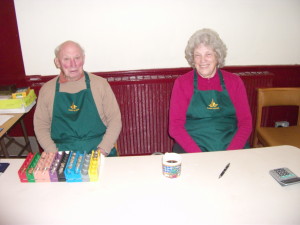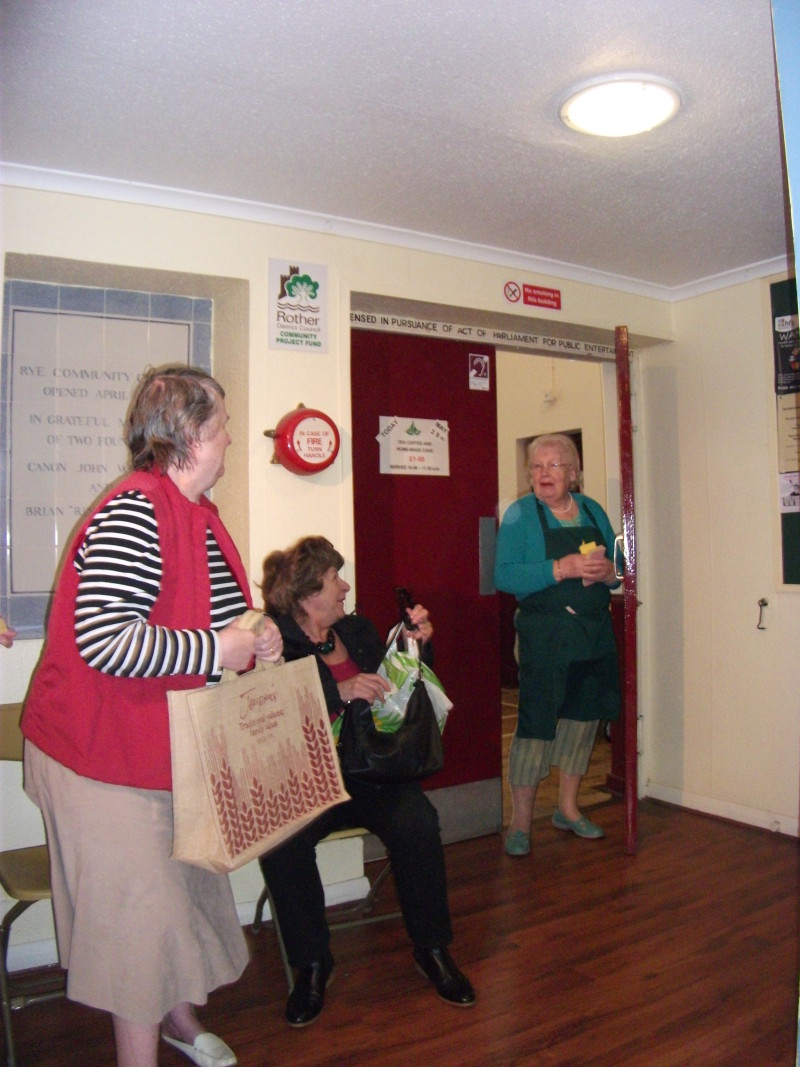From around 9:45 every Friday morning, in the growing months, an alert but orderly queue of both sexes forms waiting for the hall doors to open at Rye’s Community Centre. Inside, stalls are being set out with flowers, plants, vegetables, jams and sauces, curries and flans, cakes and biscuits, yoghurts and cream and even some clothing and other soft goods – all home made, all locally grown, all in the country market.
As you enter you are given a ticket and each time you buy something, the stallholder notes it on the ticket. On your way out, the purchases are totted up, you pay and your ticket is stamped to show you’ve paid. However, some, even if they did race to buy their weekly stock of floral arrangements (which go all too fast), will linger for a coffee, a cake and a chat.
When you leave, your money will be taken by John Holbrook of Regent Square who may well have curried your favour with lemon chicken carefully compiled with ginger, garlic, coriander, spices and lemon. He is reputed to have a vast repertoire of curry recipes. However, you may also have been tempted by a flan from the Ashton-Cobbs from Wittersham, or even one of their various plants – and I have (I think) their tomato, courgette and marrow plants lurking in my garden.

The flowers are always popular, with made-up arrangements as well as large bunches and there is also a wide choice of vegetables, including Mrs Stapley’s radishes. She explains the long history of this Rye institution while I get some coffee and catch up on the gossip.
“Rye Country Market is part of a national organisation whose roots go back to the last century, the early 1900s, when the Agricultural Organisation (now DEFRA, the Department for the Environment, Food and Rural Affairs), invited the newly forming Women’s Institutes (WIs) to become involved in its ongoing programme of setting up co-operative markets to sell surplus produce, which became an invaluable fresh food source during World War One.
“Towards the end of WW1, the responsibility for the co-operative markets was moved to the Food Production Department of the Board of Agriculture and at the same time, the existing WIs agreed to form the National Federation of Women’s Institutes (NFWI), as a separate independent voluntary organisation, although still receiving considerable financial support from the government.
“Although these co-operative markets had been evolving for nearly two decades, it is widely accepted that the Produce Market which opened in Lewes East Sussex, in December 1919, is the first official WI market and the formation of WI Markets Limited followed a little later. With the war over, the need to maximise food production was less urgent, but the number of markets continued to grow, as they provided the opportunity to not only sell surplus garden produce, but a way for housewives to supplement meagre incomes by using their baking skills to sell homemade pies, cakes and so on. In the hard times between the two World Wars, this made a tremendous difference to many struggling families.
“By 1932 there were numerous markets up and down the country, and it was considered necessary to formalise and standardise the marketing procedures. All markets were registered as bona fide co-operatives and gradually grouped into societies for ease of administration and the market societies became the legal trading bodies for markets in their areas. But, in 1995, the NFWI was advised by its solicitors, that the status of markets as a business was not compatible with the charitable status of WIs so a legal separation of the two organisations followed, and WI Country Markets was established as a self-financing, self-regulating body.
“From then on the NFWI was no longer involved in the organisation and running of markets and in 2004 the initials, WI, were dropped altogether from the title and the name changed to Country Markets Limited, which is as it stands today, although many still call us the “WI Market”! This name became synonymous with fresh high quality locally produced goods and although the name has changed, standards certainly have not! Throughout the UK there are roughly 300 markets operating and we all continue to uphold the traditional values of homemade, home produced and hand crafted products and are rightly proud of the high standard of everything we sell.
“Here at Rye, we have been trading for 43 years and can be found on Friday mornings at the Community Centre, Conduit Hill, Rye from 10-11:30 am, mid-March to mid-December. We have homemade cakes, savouries, preserves, free range eggs, plants, vegetables, fruit, flowers and crafts. All baked goods are made fresh in the two days prior to market, with savouries no earlier than the day before. Seasonal fruit and vegetables are picked the day before and some even on the morning of the market – and they will not come fresher than that! We aim to please, so if you can’t see what you are looking for, then ask, as we try our best to fulfil requests. We also run a hamper scheme so if you are looking for a nice gift for someone, give that a thought.
“Tea, coffee and hot chocolate are available, all served with homemade biscuits. We also hold Coffee/Cake days, where a cup of tea or coffee and a generous slice of homemade cake can be had at a very reasonable price – at present this is £1.50. On these occasions there is also a raffle for a box of market goodies. So please, if you haven’t yet found us, or it’s been a long time since you last visited, do come along and give us a try. You can be sure of a very warm welcome.
“Meet your friends here for coffee and make it a social occasion. We also welcome new producers, so if anyone likes baking, gardening or making things and wants an outlet for these talents, then come and speak to us. You won’t make a fortune, but you will make friends and get a great deal of satisfaction.”
Photos: Sandra Lanigan



